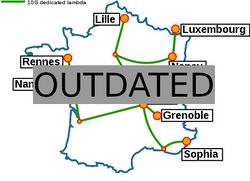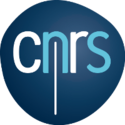Grid5000:Home
|
Grid'5000 is a large-scale and versatile testbed for experiment-driven research in all areas of computer science, with a focus on parallel and distributed computing including Cloud, HPC and Big Data. Key features:
Older documents:
|
Random pick of publications
Five random publications that benefited from Grid'5000 (at least 2932 overall):
- Khaled Arsalane, Guillaume Pierre, Shadi Ibrahim. Toward Stream Processing Elasticity in Realistic Geo-Distributed Environments. IC2E 2024 - 12th IEEE International Conference on Cloud Engineering, IEEE, Sep 2024, Paphos, Cyprus. pp.1-9. hal-04655408v2 view on HAL pdf
- Reda Khoufache, Anisse Belhadj, Mustapha Lebbah, Hanene Azzag. Distributed MCMC Inference for Bayesian Non-parametric Latent Block Model. 28th Pacific-Asia Conference on Knowledge Discovery and Data Mining, PAKDD 2024, May 2024, Taipei, Taiwan. pp.271-283, 10.1007/978-981-97-2242-6_22. hal-04623748 view on HAL pdf
- Donatien Schmitz, Guillaume Rosinosky, Etienne Rivière. Justin: Hybrid CPU/Memory Elastic Scaling for Distributed Stream Processing ⋆. DAIS 2025 - 25th International Conference on Distributed Applications and Interoperable Systems, Daniel Balouek; Ibéria Medeiros, Jun 2025, Lille, France. pp.1-17. hal-05081993 view on HAL pdf
- Emile Cadorel, Dimitri Saingre. A Protocol to Assess the Accuracy of Process-Level Power Models. Cluster 2024, IEEE, Sep 2024, Kobe, Japan. hal-04720926 view on HAL pdf
- Houssam Elbouanani, Chadi Barakat, Walid Dabbous, Thierry Turletti. Troubleshooting Distributed Network Emulation. Annals of Telecommunications - annales des télécommunications, 2024, 79 (April), pp.227-239. 10.1007/s12243-024-01010-y. hal-04373896 view on HAL pdf
Latest news
Failed to load RSS feed from https://www.grid5000.fr/mediawiki/index.php?title=News&action=feed&feed=atom: Error parsing XML for RSS
Grid'5000 sites
Current funding
As from June 2008, Inria is the main contributor to Grid'5000 funding.
INRIA |
CNRS |
UniversitiesUniversité Grenoble Alpes, Grenoble INP |
Regional councilsAquitaine |


